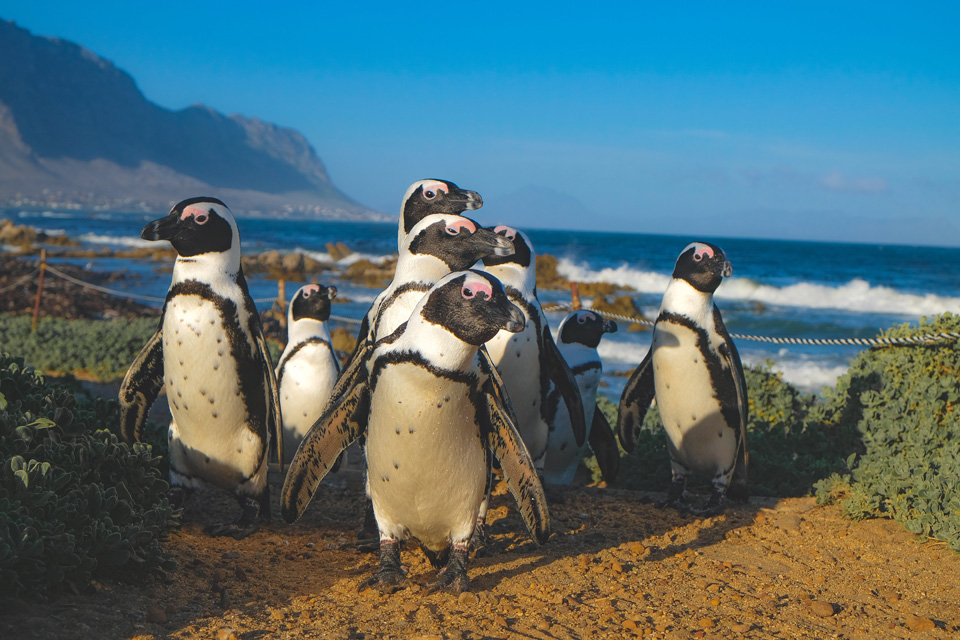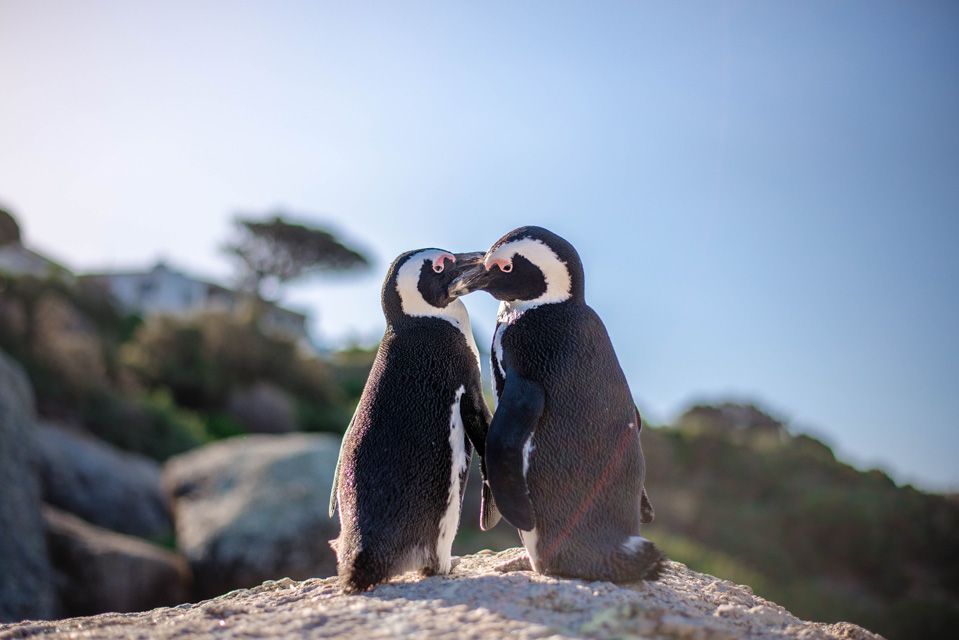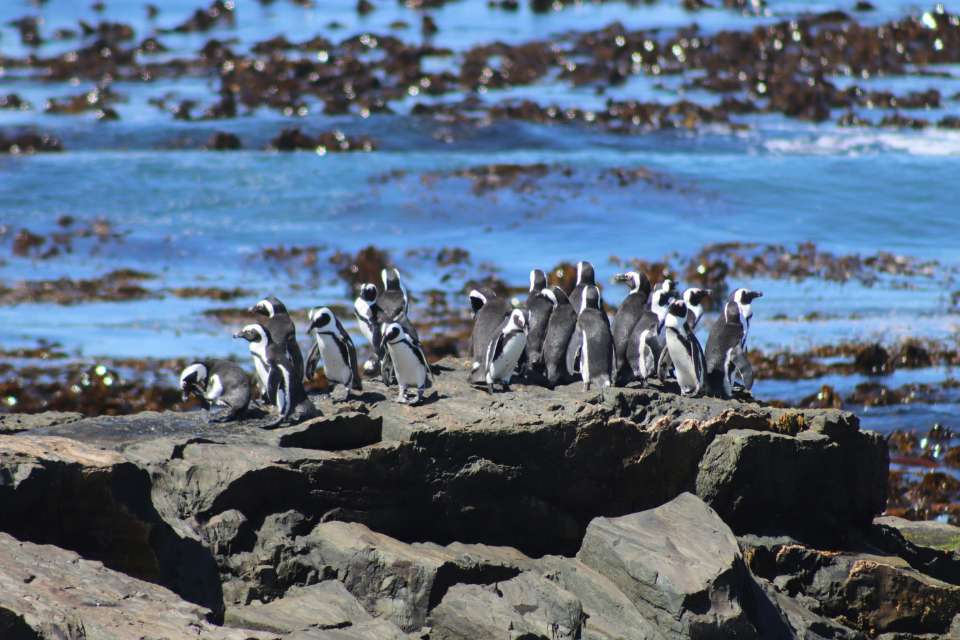Welcome to Robben Island, a South African National Heritage Site and UNESCO World Heritage Site that offers a unique experience of South Africa’s diverse wildlife.
Nestled in Table Bay, this island is not only known for its historical significance but also for its vibrant penguin colony. Managed by Robben Island Museum, the island is an Important Bird and Biodiversity Area, providing a safe haven for various marine species, including the charismatic African penguins.
With its rich ecological significance, Robben Island has become a must-visit tourist attraction, offering a glimpse into the enchanting world of penguins in South Africa.
Key Takeaways:
- Robben Island is a South African National Heritage Site and UNESCO World Heritage Site.
- The island is home to a vibrant penguin colony, managed by Robben Island Museum.
- African penguins, also known as jackass penguins or black-footed penguins, are native to the island.
- Robben Island is an Important Bird and Biodiversity Area, protecting various marine species.
- Visiting Robben Island offers a unique opportunity to witness the charm of penguins in their natural habitat.
The African Penguins of Robben Island
Robben Island is home to a thriving colony of African penguins, also known as jackass penguins or black-footed penguins. These iconic birds are endemic to the southern coast of Africa and are classified as an endangered species by the International Union for Conservation of Nature.
The penguins rely on the island’s rocky shores to build their nests and breed, forming a close-knit community. They have fascinating breeding habits, with males and females taking turns to incubate the eggs and care for the chicks.
However, the population of African penguins has drastically declined over the years, making penguin conservation efforts crucial for their survival.
The Role of Robben Island in Penguin Conservation
At Robben Island, we play a vital role in the conservation of African penguins. Our island serves as a monitoring site for these magnificent birds, providing valuable data on their breeding success, response to fishing closures, and the availability of fish – all factors that directly impact their survival.
As a marine protected area, Robben Island ensures the preservation of the penguins’ habitat. This status allows us to contribute to their long-term conservation and safeguard the delicate balance of marine life that surrounds us.
But our efforts don’t stop there. We are proud to have a dedicated Penguin and Seabird Ranger on our team. Their role is crucial in monitoring the well-being of the penguins and working closely with Robben Island Management to implement conservation measures.
By studying the penguins’ behavior and recording their responses to fishing closures, we can gather valuable insights into their population dynamics and the impact of human activities on their environment.
This knowledge helps us make informed decisions, ensuring the sustainability of these extraordinary creatures.
At Robben Island, we believe in the power of collaboration. By working together with various organizations and researchers, we strive to develop innovative solutions to protect and conserve the African penguins.
Through our combined efforts, we can ensure a brighter future for these iconic birds and preserve the beauty of our marine ecosystems for generations to come.
The Plight of African Penguins
African penguins, classified as an endangered species, are facing numerous threats that have led to a significant decline in their population. Overfishing, climate change, and marine degradation are some of the main challenges these vulnerable birds are exposed to.
The past century has witnessed a staggering reduction of over 95% in their numbers, posing a serious concern for their survival. Furthermore, oil spills, hunting, egg collecting, and the presence of alien predators have had devastating effects on their populations. Consequently, urgent intervention and comprehensive conservation efforts are crucial to prevent the African penguin from going extinct.
Other Places to See Penguins in South Africa

While Robben Island is renowned for its penguin colony, South Africa offers a variety of locations where you can observe these captivating birds in their natural habitats. Here are some notable spots:
- Boulders Beach: Located near Simon’s Town, Boulders Beach is home to a popular penguin colony. Visitors have a unique opportunity to swim with the penguins and witness their playful behavior up close.
- Stony Point Nature Reserve: Situated in Betty’s Bay, this nature reserve is another great destination to see penguins. You can stroll along the boardwalks and observe the penguins in their tranquil coastal habitat.
- St Croix Penguin Island: Nestled in Port Elizabeth, this small island is known for its African penguin colony. Take a boat tour and marvel at the sheer number of penguins inhabiting the island.
If you’re interested in learning more about penguin conservation efforts, be sure to visit the SANCCOB centers in Cape Town and Port Elizabeth. These centers provide invaluable care to injured seabirds, including African penguins, and offer educational opportunities to raise awareness about the importance of protecting these remarkable species.
Interesting Facts About Penguins

Penguins are truly remarkable creatures with a multitude of fascinating characteristics. These flightless birds are renowned for their exceptional swimming and diving abilities, propelling themselves gracefully through the water with their sleek bodies and webbed feet.
When it comes to African penguins, they possess unique traits that distinguish them from other penguin species. Their iconic black and white plumage features a distinctive horseshoe-shaped band across their chests, along with charming white hood-like markings on their cheeks.
Additionally, African penguins have a captivating patch of pink skin surrounding their eyes, adding to their distinctive appearance.
One interesting aspect of penguin behavior is their strong sense of monogamy. African penguins form lasting partnerships and choose a mate for life. In fact, they have been observed engaging in same-sex partnerships, highlighting their diversity and adaptability.
Another remarkable characteristic of penguins is their ability to drink saltwater. Unlike most animals, penguins have a unique gland located above their eyes that filters out excess salt, allowing them to consume seawater for hydration.
Penguins also undergo an annual molting process, shedding their old feathers and regrowing new ones. During this time, they are unable to swim and must remain on land until their new plumage has fully developed.
From their incredible swimming skills to their captivating appearance and intriguing behaviors, penguins continue to captivate our imaginations. The African penguins’ distinctive features and engaging habits make them a truly captivating species to study and admire.
Conclusion
The presence of African penguins on Robben Island and other locations in South Africa highlights the importance of conservation efforts for this endangered species.
The decline in their population serves as a grim reminder of the threats faced by wildlife in our changing world. By visiting and supporting initiatives like the Robben Island Penguin and Seabird Ranger Project and the SANCCOB centers, we can contribute to the protection and preservation of these charismatic creatures.
Exploring the natural habitats of penguins in South Africa offers a unique opportunity to connect with our country’s treasured wildlife and gain a deeper appreciation for the need to conserve these extraordinary birds for future generations.
The remarkable resilience and unique characteristics of African penguins make them a symbol of our commitment to safeguard South African wildlife and ensure its survival.
Together, we can make a difference in the conservation of African penguins. Let us join hands to create a sustainable future for these incredible creatures and the ecosystems they inhabit.
By ensuring the continued existence of penguins on Robben Island and throughout South Africa, we are not only preserving a piece of our natural heritage but also advocating for the protection of all vulnerable species that rely on our collective efforts for their survival.
FAQ
What is the significance of Robben Island for penguins?
Robben Island serves as a crucial breeding site and habitat for African penguins. It is a monitored location for studying their breeding success and response to fishing closures and fish availability.
Why are African penguins considered an endangered species?
African penguins are classified as endangered due to the drastic decline in their population over the years. Factors such as overfishing, climate change, marine degradation, oil spills, hunting, egg collecting, and alien predators have contributed to their endangered status.
Where else in South Africa can I see penguins?
Besides Robben Island, you can visit Boulders Beach near Simon’s Town, Stony Point Nature Reserve in Betty’s Bay, St Croix Penguin Island in Port Elizabeth, and SANCCOB centers in Cape Town and Port Elizabeth to observe penguins in their natural habitats.
What are some interesting facts about penguins?
Penguins are flightless birds and exceptional swimmers and divers. African penguins have unique features such as black and white plumage, horseshoe-shaped bands, hood-like markings on their cheeks, and pink skin around their eyes. They are monogamous, capable of drinking saltwater, and engage in same-sex partnerships.
How can I contribute to African penguin conservation?
By visiting and supporting initiatives like the Robben Island Penguin and Seabird Ranger Project and the SANCCOB centers, you can actively contribute to the protection and preservation of African penguins and their habitats.

